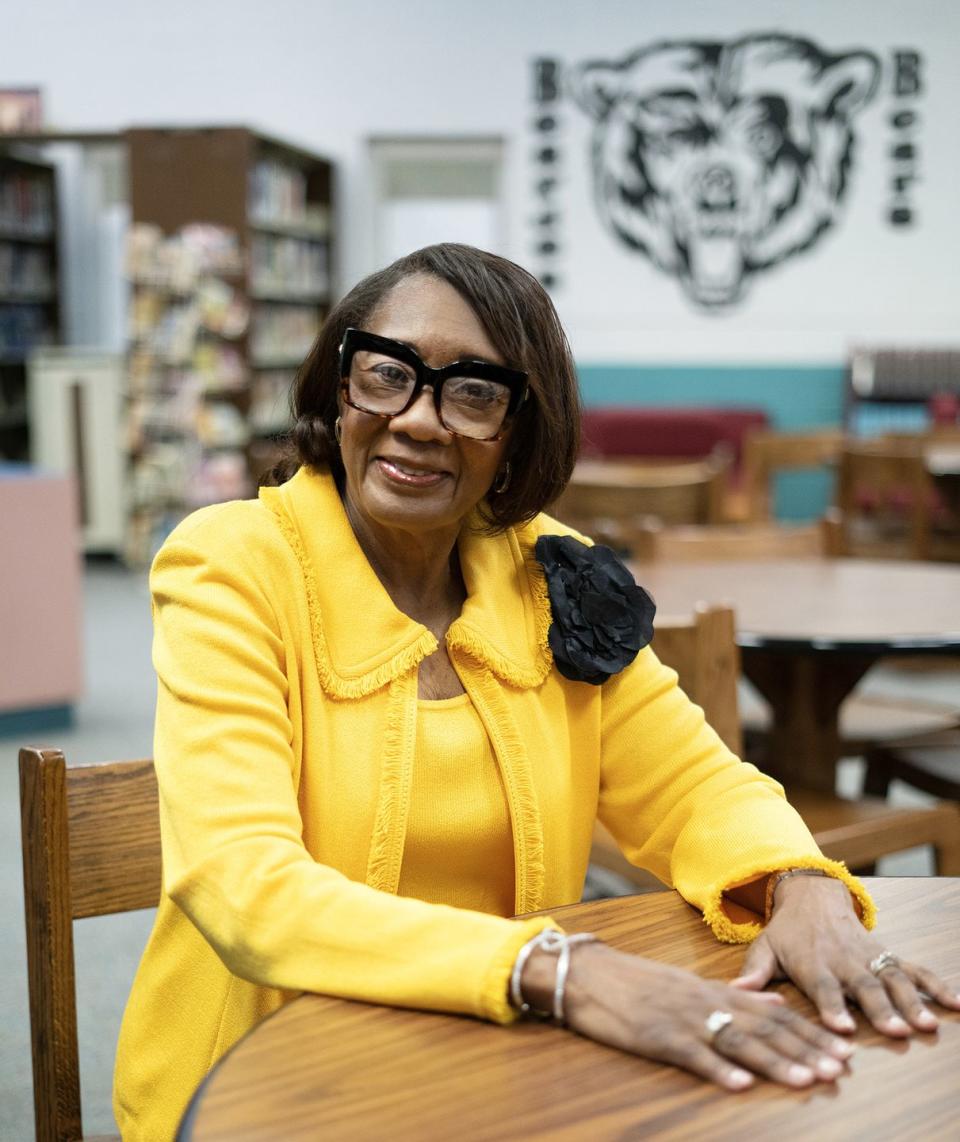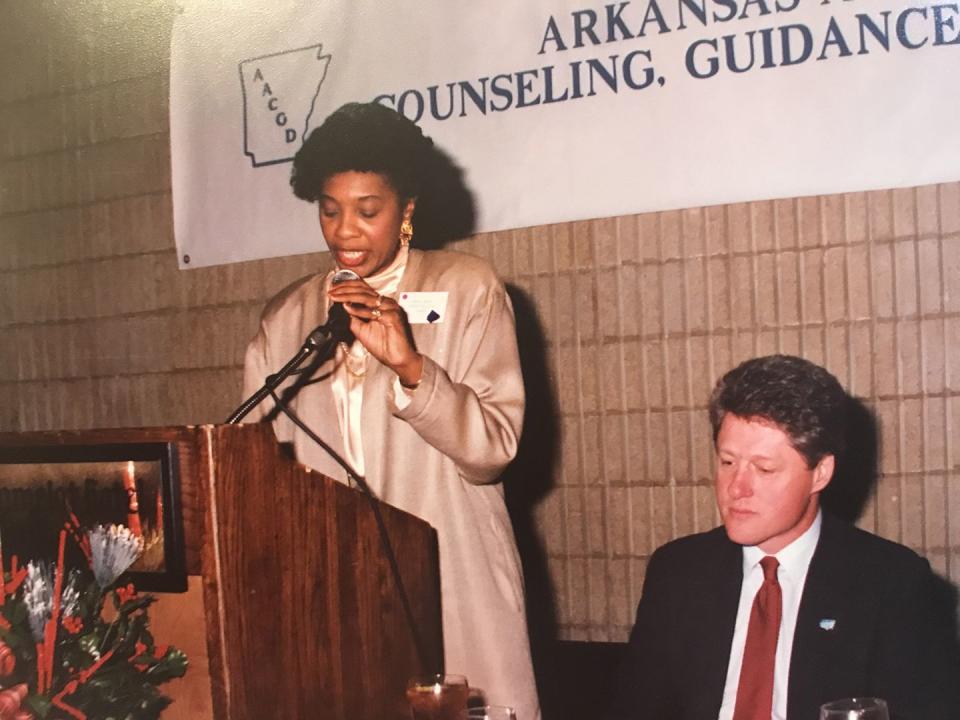Pearlie Newton, 76, Is a Small-Town Teacher Who Prepared Students "For a Much Larger World"

“Hearst Magazines and Verizon Media may earn commission or revenue on some items through the links below.”

Interview by Carly Olson/
Photograph by Aaron R. Turner
Pearlie Newton, 76, is a retired English teacher and guidance counselor from Bearden, Arkansas. Here, she discusses going back to school while raising children, cultivating a loving marriage, and the importance of expanding one’s horizons in work and in life.
Carly Olson: Have you always lived in Arkansas?
Pearlie Newton: Always. All my years.
CO: What makes it feel like home?
PN: Arkansas is a great state, period. It has a lot of good scenic spots. But when my children were growing up, we did not confine ourselves to Arkansas. I wanted to do the same thing that my mom did for me—to expose them to other activities and areas that our town didn’t have. We wanted to try and make sure that we let them know that even though you're from a small town, that does not define who you are, and once you know there’s another world out there, you’re just a microcosm of what is.
CO: How did your mom impart that to you?
PN: My mother was far ahead of her time. She was futuristic, I guess you could say. She knew what she wanted for her children, and she wanted to give us the opportunities that she didn’t have, and she stressed education as a key. My mother wasn’t a book-educated person, but she was well educated in the ways of life, the things that are most important. Knowing how to love, knowing how to give, knowing how to share, being determined, and not quitting.
I remember when we were children, just growing up—not necessarily children, but teenagers—she wanted us all to learn how to drive a car, and she would take us out, and she would teach us one at a time, depending on the age, and then she’d send us to the store, which was probably about a mile from where we lived. She always wanted us to travel, which was not very common during that time, because people did not have the finances and that kind of thing. She would always want to take us to a restaurant, and her idea of a restaurant at that time was just a burger place, but she wanted you to be able to order from the menu.
Now, this sounds just very ordinary, but it wasn’t something that everybody would do at that time. Whatever she thought would expose us as we were growing up, she would do it.
CO: You were an English teacher for many years, and I always found my English classes to be very impactful for exactly that reason. You can be exposed to other places in real life, but also through literature.
PN: Since my students were from a small town, I always wanted them to know that Bearden is your home, but that doesn’t mean that you're always going to live here. There’s a world outside of Bearden. I tried to instill in them a love for reading, but I always wanted them to know, just because you’re from a small town, prepare yourself for a much larger world.

CO: You mentioned you went back to school for your master’s degree after you already had kids. How did you do it?
PN: Well, looking back, I’m not really sure. But at any rate, in order to be a counselor, I needed a master’s, so I thought, OK. I’ll go back to school.
I didn’t hire a babysitter. I just took the two kids with me during the summer, which is funny now. My youngest was probably 5, and I would just get them up in the morning, dress them, and we would drive to Arkadelphia, which is about a 55-minute drive. They had a nice student union, and my children were pretty well-behaved, so they would sit in the student union while I went to class, and they would have puzzles, coloring books, and stuff like that.
After school, we still had family time, but usually I would study at night, in bed, and my husband would help me review and help me pass my tests. I would just give him the questions and say, OK, ask me these and see if I know the answers. That was my way of learning and remembering while keeping him engaged, as well, so that he wouldn’t feel he was just left out there by himself. Looking back, I can’t even imagine how I did it, but I did.
CO: It’s inspiring that you just jumped into it and you just took the challenges as they came up. Is that how you think about doing things?
PN: Normally, I think about things for a long period of time, but with that, I guess I’d already worked it out in my mind. I knew I wanted a master’s, and I knew I didn’t want it in English, and so, I was just looking at my options, and I thought, OK, we can do this.

CO: How long have you and your husband been married, and how did you meet?
PN: It’s been 55 years. Our eyes met across a classroom. We were 7th graders, no doubt, but we just grew up together, probably six miles between where I lived and where he lived, but basically, we were in the same classroom and grade. You have no idea, but back in the day, you just kind of spotted somebody. You caught eyes. We didn’t have the nerve to say anything to each other.
CO: There’s a difference between whispering “I like you,” and being married for over 50 years! What advice do you have for maintaining a long-term relationship?
PN: I think the best advice I could give any young couple is to be patient with each other, and be persistent in knowing that we’re going to make this work. We’re not throwing in the towel when it gets difficult, but work through it. Just don’t give up. If there’s love, that’s a good thing that will hold you.
My husband has been very supportive of whatever I thought I needed to do. He was always encouraging. One Christmas, and I do regret this to this day, he bought me a lambskin coat. It was gorgeous, but way out of our budget, and I said, there is no way I can keep this. But looking back, I think I should have just kept that coat and wore it. He wanted me to have it. It wasn’t that I didn’t appreciate it, I just thought, We don’t have that kind of money. He has always been a gift giver. When I finished my master’s, he went and he bought me a nice diamond ring, and when I look back, he’s always been there, and he’s always been generous. It never mattered what it cost if he thought it would bring a smile or light my eyes, he would do it, and you know, I’m always the one watching the pennies and thinking, Oh, we don’t need to do that. So we balanced each other. He’s just been there all my life.
CO: Do you think opposites attract?
PN: I think so. We both are tall and played basketball, but our personalities were different. He was a little more laid back and I was far more outgoing.
We’re still, to this day, kind of opposite. The movies that he likes, westerns, I don’t like those, but I watch them because I want to be in the room. Now we’ve got TVs in all the rooms, and I complain because he watches the westerns, yet I don’t move to another room to watch.
He can walk in a room and I still know, That’s my man. I know when he walks in the room, even if I don’t see him. It’s like I can almost feel him. I don’t know how, but I know. And he makes my heart skip a beat, even to this day.
CO: What qualities does your generation have that you feel like some of the other younger generations might need more of?
PN: I think not throwing in the towel. Some stick-to-it-ness, if there’s such a word. Just hanging in there and being determined, knowing that anything worth accomplishing isn’t always easy. There will be some rough spots, but don’t give up. I’m just not a quitter. I don’t quit anything. If I begin it, I’m in it for the long haul.
About the Journalist and Photographer
Turn Inspiration to Action
Consider donating to the National Association of Black Journalists. You can direct your dollars to scholarships and fellowships that support the educational and professional development of aspiring young journalists.
Support The National Caucus & Center on Black Aging. Dedicated to improving the quality of life of older African Americans, NCCBA's educational programs arm them with the tools they need to advocate for themselves.
This story was created as part of Lift Every Voice, in partnership with Lexus. Lift Every Voice records the wisdom and life experiences of the oldest generation of Black Americans by connecting them with a new generation of Black journalists. The oral history series is running across Hearst magazine, newspaper, and television websites around Juneteenth 2021. Go to oprahdaily.com/lifteveryvoice for the complete portfolio.

You Might Also Like

